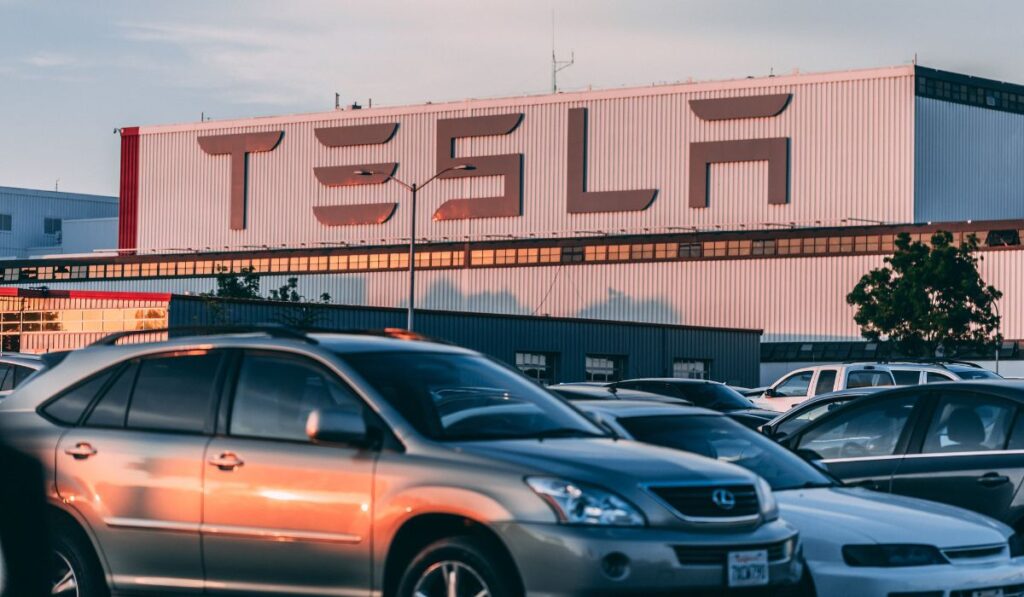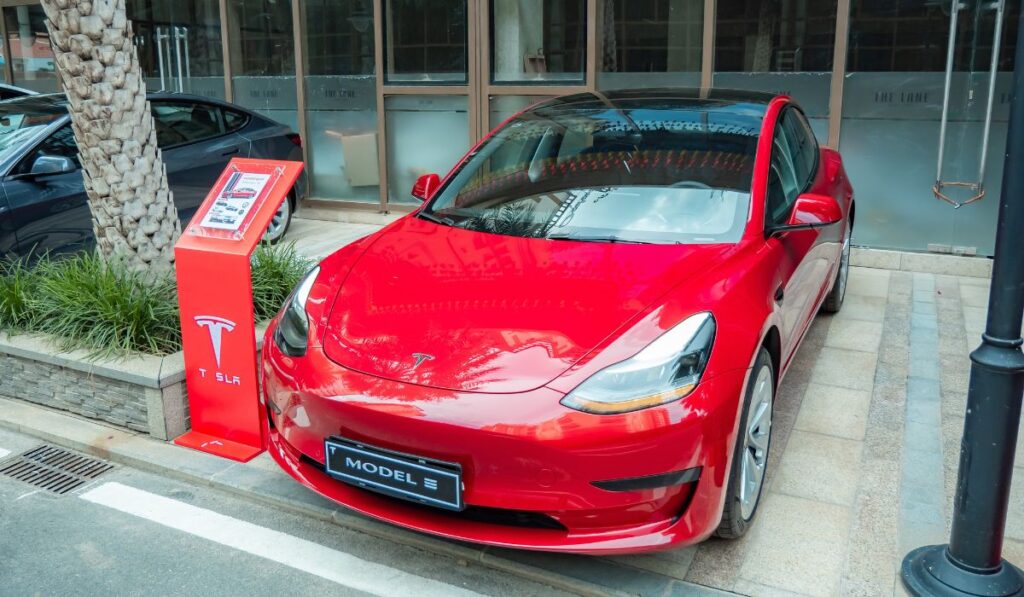Tesla is one of the most popular EV manufacturers on the market, and it sometimes feels like everybody’s trying to get their hands on one. But Tesla vehicles aren’t cheap — and they have long delivery times. So, can you trade in a used vehicle for a new or pre-owned Tesla?
Tesla allows customers to trade in used vehicles for a discount toward purchasing a new or pre-owned Tesla. You can trade passenger vehicles, trucks, minivans, and SUV models for exchange value. The process is convenient and straightforward. Exchange offers are, however, non-negotiable.
There’s a lot to consider if you’re thinking about exchanging your used vehicle for a shiny new Tesla. But will Tesla give you the best price for your vehicle, and is this the best move for your situation? Let’s take a closer look at the process and everything you should know before you proceed.
Can You Sell Your Old Car to Tesla?

Yes, it’s entirely possible to trade in your old vehicle for a discount when purchasing a new or pre-owned Tesla. You can trade in passenger vehicles, trucks, minivans, and SUV models for exchange value towards your new or pre-owned Tesla vehicle. Cars with internal combustion engines (ICE) and electric cars (EV) also qualify for exchange.
However, you can’t trade in motorcycles, RVs, or commercial automobiles for exchange value. Tesla does not accept four-wheelers, mopeds, or non-drivable cars for exchange. These limitations apply whether you’re purchasing a new or pre-owned Tesla vehicle.
Tesla also only accepts one vehicle for exchange value.
Can You Exchange Financed Vehicles?
Fortunately, Tesla accepts exchange vehicles with active finance payments. Tesla calculates and compares the pay-off amount and positive or negative equity. They add this calculation to the Motor Vehicle Purchase Agreement.
Can You Exchange Salvage or Branded Vehicles?
Yes, you can trade in non-Tesla vehicles with salvaged or branded vehicles. Tesla accepts vehicles with salvage, rebuilt, lemon, junk, recycled, or not actual miles (NAM) branded titles.
The vehicle’s title branding must be completed beforehand. The vehicle title must display the correct branding, or it won’t qualify.
Note: You cannot trade in Tesla models with salvage, rebuilt, lemon, junk, recycled, or not actual miles (NAM) branded titles.
How Does Tesla Exchange Work?
A Tesla representative will reach out and start the exchange process after you place your order and a Vehicle Identification Number has been issued. Tesla requires the following information for exchange offers:
- The Vehicle Identification Number (VIN)
- The vehicle’s mileage
- Your zip code
- Photos of the vehicle submitted to your Tesla User Profile
The Tesla representative will consult you when the exchange deal is available for evaluation. You must then drop off the exchange car on your drop-off date.
You can apply any applicable equity to the final purchase of an exchange Tesla vehicle. Customers must pay negative equity at drop off or when they purchase the Tesla model, depending on credit approval.
Tesla Determines the Value of Your Vehicle
Tesla uses market data, industry-standard techniques, and other resources to determine the offer for your non-Tesla exchange vehicle. Tesla determines offers for Tesla-brand vehicles based on model configuration, history of use, mileage, and lifespan.
Tesla uses market data and internal product knowledge for the complete exchange value.
When Do You Receive a Exchange Evaluation?
Tesla asks customers to submit their exchange information into their Tesla Accounts before the delivery date. Tesla offers the final trade value based on current market conditions after you submit the vehicle details. Tesla exchange evaluations are valid for 30 days or 1,000 miles.
Do Aftermarket Modifications Harm Exchange Offers?
Unfortunately, aftermarket vehicle adjustments can have an adverse impact on Tesla exchange offers. Tesla prefers ‘stock’ exchange vehicles or cars in their original, unmodified condition.
Where Do You Drop Off Your Exchange Vehicle?
You must drop off your exchange vehicles during the scheduled delivery window. Tesla doesn’t recieve exchanges before or after the delivery appointment. You can’t drop off your exchange vehicle at a separate drop-off site. You must use the assigned drop off location for your appointment.
Do You Have to Drop Off Your Exchange Vehicle?
Yes, you must be in person when you drop off your exchange vehicle if you’re noted on the automobile title and registration. You must be there in person and sign the exchange forms. If you don’t show up, you might face delivery or exchange delays.
Does Tesla Report Exchange Sales?
Tesla does not take responsibility for reporting exchange transactions to your region’s motor vehicle facility. In some locations, you might have to inform your region’s MVD after the exchange documents are finished and reassigned to Tesla.
You’ll need to consult your state’s motor vehicle facility for the most accurate information available.
Does Tesla Negotiate on Exchange Value?
Unfortunately, Tesla doesn’t negotiate any exchange evaluations. Tesla is not a used dealership and doesn’t rely on exchange vehicles.
The exchange service is mainly a convenience for customers and draws in potential buyers. Tesla can’t sell ICE vehicles or other non-branded Tesla vehicles in their parking lots, either.
Tesla Exchange: Advantages and Disadvantages
There are a few advantages, disadvantages, and considerations to keep in mind when exchanging a used vehicle for Tesla:
Tesla Exchange Advantages
- The exchange process is simple. Tesla provides customers with easy steps to trade in used vehicles. They don’t require excessive amounts of information on a vehicle’s condition either.
- Some states provide tax benefits. Some locations offer tax advantages that allow customers to pay sales tax on the final purchase price after the exchange value is included.
- Tesla includes negative equity. Tesla calculates negative equity or remaining loan payments you might have into the total purchase agreement.
- Tesla offers a complete exchange evaluation. Non-Tesla vehicles and ICE cars receive a hassle-free, final-exchange evaluation similar to other dealerships like Carmax or Carvana.
Tesla Exchange Disadvantages
- Tesla doesn’t negotiate. Tesla has a no-hassle offer but doesn’t include negotiations. You can’t receive a better price, and the offer is left as is.
- Software purchases don’t receive exchange value. Tesla doesn’t offer exchange credit for software additions or other perks. This includes Full Self-Driving or transferable Free Unlimited Supercharging.
- Most used Tesla vehicles can be sold for more than Tesla’s exchange evaluation.
- Tax savings may not provide enough value. Tax savings for Tesla vehicles might not add enough savings to make it worthwhile. The sales tax for a Tesla exchange typically doesn’t match the rate you would receive for selling your Tesla privately.
- Changing delivery times can alter your exchange offer. Tesla is providing more consistent delivery times, but delays can change exchange offers. Exchange rates may not be locked.
- Aftermarket modifications reduce value. Tesla prefers vehicles close to stock condition. Aftermarket modifications reduce the exchange value at Tesla. If you’ve put a lot of work into your vehicle, you’ll receive a lower exchange offer.
- You might have to wait for exchange offers. Tesla might not provide an exchange quote until you’ve purchased a pre-order or bought a new/used vehicle. Market fluctuations and extended delivery periods make it difficult for Tesla to offer estimates without purchase. These limitations make it challenging to find better deals.
Is Tesla Exchange Worth It?

Tesla provides customers with a convenient way to trade in their used vehicles, whether they’re Tesla-branded or not. Customers can trade in passenger vehicles, trucks, vans, and SUV models for exchange value towards their new or pre-owned Tesla vehicle.
A Tesla representative will reach out and start the exchange process after you place your order and a VIN has been assigned.
Although the exchange process is convenient and straightforward, it might not be best for every circumstance. For example, Tesla doesn’t negotiate prices, and most used Tesla vehicles can be sold for more value privately.
Whether you decide to trade in your automobile to Tesla or look elsewhere will depend significantly on your situation and how much time and effort you’d like to dedicate to the cause.
